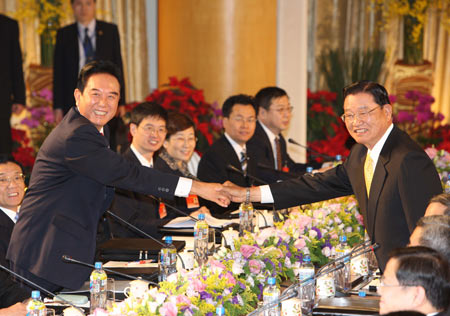
President of the Chinese mainland's Association for Relations Across the Taiwan Straits (ARATS) Chen Yunlin (L) shakes hands with Chairman of Taiwan's Straits Exchange Foundation (SEF) Chiang Pin-kung before their talks in Taichung, Dec. 22, 2009. ARATS President Chen Yunlin and SEF Chairman Chiang Pin-kung met for the fourth round of talks since the two sides of the Taiwan Strait resumed negotiations in June last year following a 10-year suspension. (Xinhua Photo)
TAICHUNG, Dec. 22 (Xinhua) -- Negotiators of the Chinese mainland and Taiwan Tuesday decided to start the long-expected discussion of the Economic Cooperation Framework Agreement (ECFA) in their next talks in 2010.
The next talks will be held in the first half of next year on the mainland, but no date is yet available.
The two sides promised to arrange the expert-level talks "as soon as possible," according to a statement issued at the fourth round of talks between the mainland's Association for Relations Across the Taiwan Straits (ARATS) and Taiwan's Straits Exchange Foundation (SEF), which handle cross-Strait issues on behalf of their respective authorities.
The two sides would also talk about protection of intellectual property rights, the statement said.
"The ECFA will be purely economic and not related to sensitive political issues," said Chen Yunlin, ARATS president, during the talks.
The pact should be based on the principles of World Trade Organization (WTO), but also on the reality of both sides, he said.
"Under the principle of mutual benefit, the two sides should try their best to remove barriers in the process of normalizing economic ties."
He expected the pact to bring maximum profits at minimum cost and promised that the mainland would consider the situation of Taiwan's economy and make "reasonable" arrangements to meet Taiwan people's concerns.
Chen suggested the two sides carry on the talks at an "active, but steady" pace.
"We could design the framework and set the targets first and then talk about detailed items step by step," he said.
SEF chairman Chiang Pin-kun said Taiwan and the mainland must jointly tackle economic challenges, and the establishment of a cross-Strait economic framework should not be delayed.
The two sides also signed three agreements regarding labor cooperation in the fishing industry, cooperation in inspection and quarantine of farm produce, and cooperation in standard measuring, inspection and certification at the meeting.
"Economic issues are and will be the major topics of our talks in near future," Chen said. "Improving economic cooperation is the most effective way to improve people's lives on both sides."
In the previous three rounds of talks since June 2008, the two sides reached nine agreements concerning transport, trade, tourism, cooperation in finance and fighting crime among other issues.
"We have done many things in the past one and half years that should have been done long before. We two sides will work to make sure the agreements are implemented and to close loopholes in them." Chen said.
Chiang called on both sides to contribute to economic prosperity and development as well as long-term peace and stability.
The agreements reached at previous meetings between SEF and ARATS had brought substantial benefits for the normalization of cross-Strait communication and benefited people on both sides, he said.
However, there was room for improvement and both sides needed to carry out further negotiations, he said.
He called for both sides across the Taiwan Strait to continue efforts to push for the development of systematic talks and promote cross-Strait communication and cooperation.
